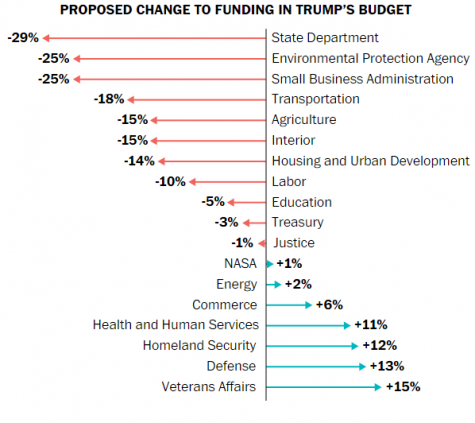The Obsession with the Military-Industrial Complex
The United States ought to cut back on military spending
The United States Army Logo. The army is one of the largest branches of the US military and takes up a huge share of its spending.
Since 2001, the United States has spent $4.9 trillion (yes, trillion), on the wars in the Middle East and Asia, and $1 trillion on healthcare for post 9/11 veterans. Every year, the United States spends more on its military budget than the next top-13 countries combined. The United States has 11 functional aircraft carriers; the second-highest country, Italy, has two.
Suffice to say, the United States is a global superpower. We think of ourselves as the world’s police-force. Since the Truman era, we have increasingly dumped funds into military operations that haven’t aided the American populace. The United States should pull back the reins and spend more time, and money, focusing on domestic issues.
In 1961, President Eisenhower warned the public of what could arise if a military industrial complex were to grow and expand. Eisenhower famously said that “The potential for the disastrous rise of misplaced power exists, and will persist.”
The United States has military bases in 80 different countries and we have nearly 200,000 soldiers stationed overseas. We are maintaining our grasp on global politics by keeping ourselves near the enemy. However, is this really necessary? The chances of another nation going to war with the current United States is extremely unlikely. We have the strongest military in the world.
An argument could be made that the reason that our likelihood of being invaded or attacked is so low is due to our colossal military. But, we are surrounded by two allies, Mexico and Canada. We don’t face the challenge of adjacent countries being able to invade us. We don’t have military tensions at our border, aside from the border protection.
The last time we have had to directly stop our land from being invaded was during World War II when Japan attacked Pearl Harbor. The biggest military oppositions today are North Korea, which isn’t really a threat, Russia, and China. The second North Korea lands a nuke on American territory, Kim’s dynasty is over. North Korea would be annihilated.
China’s military has more personnel than the United States, but we have 27.7 times more nuclear weapons, the most effective military deterrent. The way China and Russia are attacking us today is via cyber-warfare.
The world is changing, technology is progressing; it would be naive to think that warfare is not changing. We are moving to using the internet to plan out and conceive attacks that could debilitate a nation.
For example, Israel and the United States created Stuxnet, a malicious computer program. The program infected computers in one of Iran’s nuclear facilities and, according to Wired.com, “manipulated valves on the centrifuges to increase the pressure inside them and damage the devices as well as the enrichment process.” The centrifuges were used to separate isotopes in uranium, which is useful for the creation of nuclear weapons.
So much of our infrastructure and our society is dependent on the World Wide Web. A critical attack on our country’s servers and access to the Internet could cripple our economy, as well as sending us back by 100 years, if the attack were to be permanent.
If we cut our military budget by just 15%, we would have 100 billion dollars to give to other facets of our government that continue to get cut, such as the Environment Protection Agency, which received a 25% cut in Trump’s 2019 budget.

President Trump’s budget plans for 2019
The United States’ culture seems to make the military above reproach. Any complaint or disagreement with the military gets you called unpatriotic. We have conflated serving our country with taking orders from our government. We should be able to criticize the United States, that’s why the first Amendment was instituted.
Instead of invading foreign nations, we should focus on our issues at home. We have four percent of the world’s population and 22% of the world’s total incarceration-population. Despite being perceived as the strongest and richest country, millions are living in poverty and some are homeless. We have a lot of issues to fix at home that deserve a higher priority than securing our military dominance.
Works Cited
“CHART: Past Presidents’ Cuts In Military Spending To Reduce The Deficit.” ThinkProgress, thinkprogress.org/chart-past-presidents-cuts-in-military-spending-to-reduce-the-deficit-85d575ff43db/.
“Defense Spending by Country.” Global Firepower – World Military Strength, www.globalfirepower.com/defense-spending-budget.asp.
Gallup, Inc. “Americans Not Convinced U.S. Needs to Spend More on Defense.” Gallup.com, 21 Feb. 2018, news.gallup.com/poll/228137/americans-not-convinced-needs-spend-defense.aspx.
“List of Aircraft Carriers.” Wikipedia, Wikimedia Foundation, 8 Mar. 2019, en.wikipedia.org/wiki/List_of_aircraft_carriers.
Macias, Amanda. “America Has Spent $5.9 Trillion on Wars in the Middle East and Asia since 2001, a New Study Says.” CNBC, CNBC, 15 Nov. 2018, www.cnbc.com/2018/11/14/us-has-spent-5point9-trillion-on-middle-east-asia-wars-since-2001-study.html.
Staff, NPR. “Ike’s Warning Of Military Expansion, 50 Years Later.” NPR, NPR, 17 Jan. 2011, www.npr.org/2011/01/17/132942244/ikes-warning-of-military-expansion-50-years-later.
“Civilians Killed & Wounded.” Civilians Killed & Wounded | Costs of War, watson.brown.edu/costsofwar/costs/human/civilians.
Davis, Tom, et al. “Where in the World Is the U.S. Military?” POLITICO Magazine, www.politico.com/magazine/story/2015/06/us-military-bases-around-the-world-119321.
Slater, Alice. “The US Has Military Bases in 80 Countries. All of Them Must Close.” The Nation, 25 Jan. 2018, www.thenation.com/article/the-us-has-military-bases-in-172-countries-all-of-them-must-close/.
“USA vs China | Comparison Military Strength.” ArmedForces, armedforces.eu/compare/country_USA_vs_China.

My name is Joshua Lind. I am a 17-year-old, tri-citizen senior at Triton High School. I am currently taking Mr. Allen's journalism class. I like to write...










